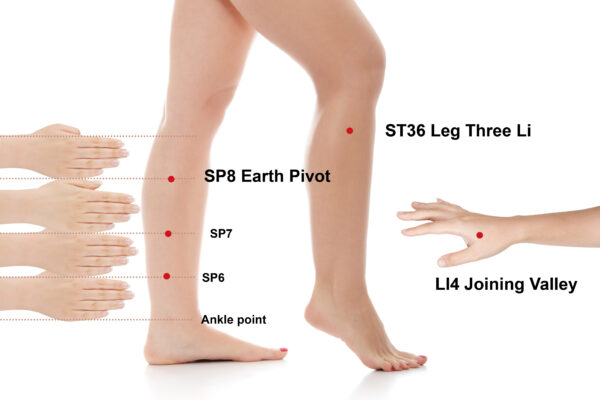Teng Cheng Liang, superintendent of Chi Teh Medical Clinic and Cheng-Liang Medical Clinic in Taipei, Taiwan, explained the various causes of constipation and introduced methods of food therapy and acupoint massage to stimulate healthy movement of the bowel.
Teng says that according to the medical definition, having less than three bowel movements a week is considered constipation and can have great impact on one’s health.
Chronic constipation causes an accumulation of toxins in the intestines and excess carcinogens to be absorbed by the body. It also increases the risk of various other conditions, such as acne, depression, and an elevated risk of heart disease to name just a few.
People with constipation are more prone to developing hemorrhoids, anal fissures, stress urinary incontinence, diverticulitis, and other ailments. A diverticulum is a bulge tissue on the intestinal wall. If stool falls into the diverticulum, it can cause inflammation of the diverticulum, resulting in sepsis—a life-threatening illness.
Some people worry about not eliminating for one or two days. Teng pointed out that as age increases, the peristalsis and absorption strength of the stomach and intestines weakens, causing difficulty in elimination. He recommended people stay relaxed when trying to move the bowels, and that there is no need to take medicine for missing just one or two days. Relying on drugs or laxatives can cause extreme reactions such as alternating diarrhea and constipation.
Main Cause of Constipation
Teng pointed out that the main reason for constipation is slow peristalsis. The small intestine absorbs nutrients and the large intestine absorbs water. When bowel movement is too slow and food stays in the large intestine for too long, the stool becomes dry, hard, and difficult to eliminate.
In addition, when the intestine absorbs water too quickly, constipation can occur.
Constipation is also closely related to the function of the peripheral nervous system. The speed of peristalsis is related to the sympathetic nervous system and parasympathetic nervous system. The sympathetic nervous system makes peristalsis slower, and the parasympathetic nervous system makes peristalsis faster.
For example, the sympathetic nervous system of a patient may be activated due to anxiety over having a medical exam, and they may experience constipation as a result. After the exam is finished, the system returns to normal. Emotional excitement, such as when traveling, also activates the sympathetic nervous system, adding to the possibility of constipation.
Conversely, feeling unhappy, upset, or having negative emotions activates the parasympathetic nervous system, which makes the bowel move faster and causes diarrhea.
Emotion and Constipation
In traditional Chinese medicine (TCM), constipation is called the excess syndrome of the stomach, that is, excessive yang qi (vital energy) in the intestines. According to the theory of intestinal dynamics, people with strong yang qi in the intestines have slow peristalsis, thus their levels of anger are also relatively greater, and they are prone to constipation. Therefore, people who are energetic in general are more prone to constipation.
Vice versa, those with fast peristalsis will consume yang qi easily, and due to the lack of essence qi (vital energy), feel tired, don’t like to drink water, feel depressed, and do not care about their surroundings.
The traditional Chinese medical book “Yellow Emperor’s Indoor Canon,” describes the stomach as “the nutrients of qi and blood.” TCM believes that the organs in the body are nourished by the spleen and the stomach, and the stomach controls the yang qi of the whole body. Teng pointed out that even if patients are seriously ill, as long as they have a good appetite, they will not die easily. On the contrary, if the patients cannot eat, their condition is very dangerous.
Top 10 Causes of Constipation
- Endocrine Dysfunction: When the thyroid is underactive, mucus and edema are produced to slow down bowel movements.
- Diabetes: Due to vascular problems, intestines become sensitive and gastrointestinal motility deteriorates, resulting in alternating constipation and diarrhea.
- Uremia: A condition where high levels of waste are stored in the blood affecting the kidney.
- Colon or rectal cancer: Tumors block the intestines.
- Irritable bowel syndrome: Constipation is caused by the activation of sympathetic nerves due to tension and anxiety.
- Diverticulosis: Diverticula are too large, affecting peristalsis.
- Taking drugs that act on the nervous system: clozapine (Clozaril, Versacloz, FazaClo ODT)
- Spinal cord injuries.
- Multiple sclerosis: Leads to abnormal nervous conductions, affecting peristalsis.
- Imperforate anus: The anus is too small and requires surgical correction.
Causes of Constipation for Parkinson’s Patients
- Stiffness of the whole body muscles, including the stiffness of gastrointestinal peristalsis.
- Patients must take Levodopa for hand tremors, which inhibits smooth muscle peristalsis and makes constipation worse.
Clinically, the more severe constipation experienced by the patient, the more severe the patient suffers from tremors.
Doctors of Western medicine usually prescribe laxatives to treat constipation, but the side effect is diarrhea, which makes people feel fatigued, Whereas the goal of TCM is to increase peristalsis to aid in the expulsion of toxins.
Eating Habits to Lessen Constipation
In addition to constipation caused by disease, other causes of slow peristalsis can be related to diet, such as overeating high-calorie foods and insufficient fiber. In addition, alcohol also slows down peristalsis.
Teng pointed out that people with constipation should cultivate the following seven habits:
- Drink enough water.
- Drink fewer caffeinated beverages.
- Avoid alcoholic beverages.
- Eat more fruits and vegetables.
- Eat more high-fiber foods.
- Eat less high-fat foods, such as milk.
- Eat less high-protein foods, such as meat, eggs, and cheese.
To avoid constipation, it is necessary to eat more foods that can help with healthy elimination. Eating more vegetables and fruits with high fiber, such as apples, strawberries, high-fiber grains, beans, and so on, can help stool pass through the colon quickly. Drinking at least eight glasses of water per day will also assist in healthy elimination.
TCM food therapy for treating constipation:
- Wu Ren Wan (tea pills): A TCM herbal remedy to clear heat, lubricate intestines, and invigorate blood.
- Rehmannia tea: Rehmannia is cool, moisturizing, and invigorating to the kidney. In addition to relieving constipation, it is also beneficial to improve insomnia and high blood sugar.
- Cassia tea: Suppresses appetite, reduces gastrointestinal heat, and aids in weight loss.
Acupoint Massage to Prevent Constipation
Teng also suggested that people suffering from constipation should massage acupoints related to the stomach, such as the Earth Pivot Point and the Leg Three Li Point on the calf, and Joining Valley Point on the hand, which can help with elimination.

Best Times for Bowel Movements
TCM believes that the 12 meridian system of the body corresponds to the twelve two-hour periods (ancient time measurement system in China). The meridian of the large intestine circulates from 5 a.m. to 9 a.m.; the meridian of the stomach circulates from 7 a.m. to 9 a.m.; the meridian of the spleen circulates from 9 a.m. to 11 a.m.
Teng pointed out that in the morning, qi and blood are concentrated in the digestive system and gastrointestinal motility, therefore it is the best time to head to the loo.
Important Notice: This article was originally published at www.theepochtimes.com by Amber Yang and Alice Zhu where all credits are due.
Disclaimer
The watching, interacting, and participation of any kind with anything on this page does not constitute or initiate a doctor-patient relationship with Dr. Farrah™. None of the statements here have been evaluated by the Food and Drug Administration (FDA). The products of Dr. Farrah™ are not intended to diagnose, treat, cure, or prevent any disease. The information being provided should only be considered for education and entertainment purposes only. If you feel that anything you see or hear may be of value to you on this page or on any other medium of any kind associated with, showing, or quoting anything relating to Dr. Farrah™ in any way at any time, you are encouraged to and agree to consult with a licensed healthcare professional in your area to discuss it. If you feel that you’re having a healthcare emergency, seek medical attention immediately. The views expressed here are simply either the views and opinions of Dr. Farrah™ or others appearing and are protected under the first amendment.
Dr. Farrah™ is a highly experienced Licensed Medical Doctor certified in evidence-based clinical nutrition, not some enthusiast, formulator, or medium promoting the wild and unrestrained use of nutrition products for health issues without clinical experience and scientific evidence of therapeutic benefit. Dr. Farrah™ has personally and keenly studied everything she recommends, and more importantly, she’s closely observed the reactions and results in a clinical setting countless times over the course of her career involving the treatment of over 150,000 patients.
Dr. Farrah™ promotes evidence-based natural approaches to health, which means integrating her individual scientific and clinical expertise with the best available external clinical evidence from systematic research. By individual clinical expertise, I refer to the proficiency and judgment that individual clinicians acquire through clinical experience and clinical practice.
Dr. Farrah™ does not make any representation or warranties with respect to the accuracy, applicability, fitness, or completeness of any multimedia content provided. Dr. Farrah™ does not warrant the performance, effectiveness, or applicability of any sites listed, linked, or referenced to, in, or by any multimedia content.
To be clear, the multimedia content is not intended to be a substitute for professional medical advice, diagnosis, or treatment. Always seek the advice of your physician or other qualified health providers with any questions you may have regarding a medical condition. Never disregard professional medical advice or delay in seeking it because of something you have read or seen in any website, video, image, or media of any kind. Dr. Farrah™ hereby disclaims any and all liability to any party for any direct, indirect, implied, punitive, special, incidental, or other consequential damages arising directly or indirectly from any use of the content, which is provided as is, and without warranties.









